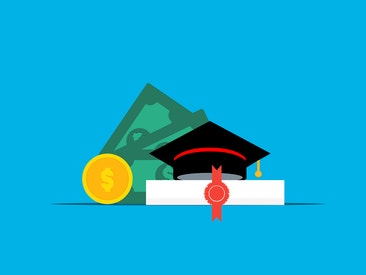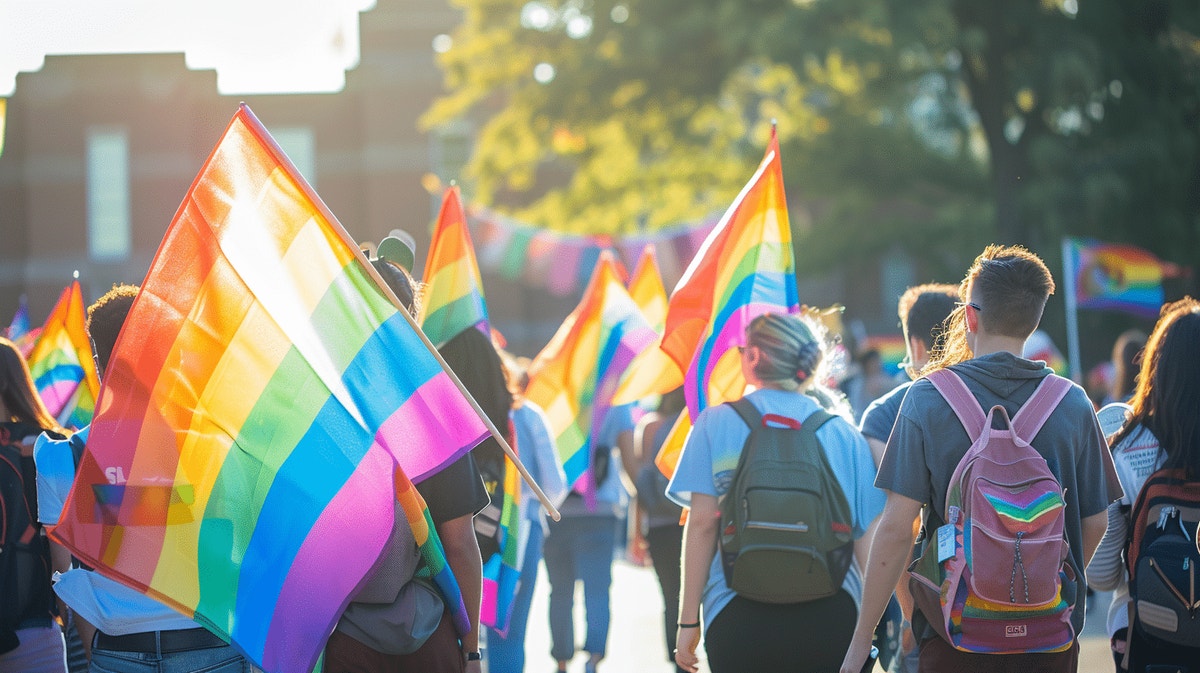
DealHack Guides
The Ultimate List of Resources for LGBTQ+ Students
35 minute read
Starting college is a thrilling chapter in anyone’s life, but if you’re an LGBTQ student, the journey can come with unique challenges and opportunities. Imagine stepping onto your new campus, excited but wondering where you'll find the support and community that understands and celebrates you. Whether finding a safe space, connecting with like-minded peers, or accessing specialized resources, having the right tools at your disposal can make all the difference.
At Dealhack, we’re not just about saving you money with the best online shopping hacks and discount codes; we’re also committed to helping you confidently navigate your college journey. This guide dives into the essential resources every LGBTQ student needs to survive and thrive academically and personally. So, let’s equip you with the lifelines that will provide comfort, empowerment, and a true sense of belonging. Are you ready to make your college experience unforgettable? Let’s dig in!
In this post, you’ll find:
Scholarships and Financial Aid: Tailored financial assistance for LGBTQ students.
Mental Health Support: Essential resources for emotional and psychological well-being.
Legal and Advocacy Resources: Tools to combat discrimination and uphold rights.
Community and Networking: Building a supportive network.
Academic Support: Programs and mentors to guide educational success.
Health and Safety: Ensuring well-being on campus.
Online Communities: Connecting with peers and allies.
Scholarships and Financial Aid

Navigating the financial aspects of higher education can be challenging, especially for LGBTQ students, who may face unique barriers and additional costs related to their identity. Scholarships and financial aid are crucial resources that can significantly alleviate the financial burden and make higher education more accessible.
This guide provides a comprehensive overview of scholarships and financial aid opportunities for LGBTQ students. It covers national and field-specific scholarships, financial aid resources, application tips, and answers to frequently asked questions. By leveraging these resources, LGBTQ students can access the support they need to pursue their academic goals and thrive in their educational journey.
1. Point Foundation Scholarship
The Point Foundation is renowned for its dedication to supporting LGBTQ students. This scholarship offers comprehensive financial aid, mentorship, and leadership training, making it one of the most sought-after scholarships for LGBTQ students.
Details:
Eligibility: Open to LGBTQ students demonstrating leadership, community involvement, and academic excellence.
Award Amount: Varies; can cover tuition, housing, books, and other expenses.
Application Process: Requires essays, letters of recommendation, and an interview.
Deadlines: Check the Point Foundation website for specific dates.
Additional Support: Recipients receive mentorship and leadership training to enhance their professional and personal growth.
Success Stories: Point Scholars often become influential leaders in their fields, contributing significantly to their communities.
2. LGBTQ Scholarship Database
Utilize platforms like the Human Rights Campaign (HRC) and Campus Pride to find many scholarship opportunities specifically designed for LGBTQ students. These databases are continuously updated, providing various options for diverse backgrounds and needs.
Details:
HRC Scholarship Database:
Features: Offers a searchable database of scholarships and fellowships for LGBTQ students.
Access: Free to use and accessible online.
Scope: Includes national, regional, and school-specific scholarships.
Campus Pride National Scholarship Database:
Features: Comprehensive listing of scholarships from various organizations, with filters for state, field of study, and more.
Access: Free to use and regularly updated.
Tips for Use: Check these databases regularly for new opportunities and updates. Use filters to narrow down scholarships that best suit your profile.
Example Scholarships from the Database:
Gamma Mu Foundation Scholarships: For gay men who demonstrate financial need.
LEAGUE Foundation Scholarships: For self-identified LGBTQ high school seniors with a service record to the LGBTQ community.
3. PFLAG National Scholarships
The PFLAG organization provides scholarships for LGBTQ students and their allies, emphasizing a commitment to equality and inclusivity. These scholarships recognize students who actively contribute to making their communities more inclusive.
Details:
Eligibility: Open to graduating high school seniors who identify as LGBTQ or as allies.
Award Amount: Typically ranges from $1,000 to $5,000.
Application Process: Includes essays and letters of recommendation.
Deadlines: Annually in late spring.
Particular Criteria: Preference is often given to students who demonstrate leadership and community involvement in support of LGBTQ rights.
Regional Chapters: Many local PFLAG chapters also offer scholarships, increasing financial aid availability at a community level.
4. The Live Out Loud Scholarship
The Live Out Loud Scholarship program celebrates and supports LGBTQ high school seniors who strongly commit to leadership, community service, and academic excellence. This scholarship is more than just financial aid; it affirms the courage and determination it takes to live out loud and proud.
Details
Eligibility: Open to LGBTQ high school seniors in the United States who plan to attend an accredited college or university.
Award Amount: Scholarships typically range from $2,500 to $10,000, depending on the available funds and the number of recipients.
Application Requirements:
Personal Essay: A 500-1,000 word essay describing your experience as an LGBTQ individual, your commitment to leadership and community service, and your academic and career goals.
Letters of Recommendation: Two letters of recommendation from teachers, mentors, or community leaders who can speak to your character, accomplishments, and potential.
Academic Records: Official high school transcripts demonstrating academic achievement.
Proof of Enrollment: Acceptance letter from an accredited college or university.
Selection Criteria: Recipients are chosen based on their leadership qualities, community involvement, academic performance, and the personal impact of their essay.
5. Pride Foundation Scholarships
The Pride Foundation offers over 60 scholarships to LGBTQ and allied students in the Pacific Northwest. These scholarships support a wide range of academic interests and professional goals.
Details:
Eligibility: Open to LGBTQ and allied students in Alaska, Idaho, Montana, Oregon, and Washington.
Award Amount: Varies; multiple scholarships available.
Application Process: A single application process allows students to be considered for multiple scholarships.
Deadlines: Typically in January.
Particular Focus: Scholarships are available for students in various fields, including STEM, arts, social justice, and more.
Tips for Applying
Stay Organized: Keep track of deadlines and required documents.
Personalize Your Essays: Reflect on your experiences and aspirations in your application essays.
Seek Recommendations Early: Request letters of recommendation well in advance.
Mental Health and Well-being
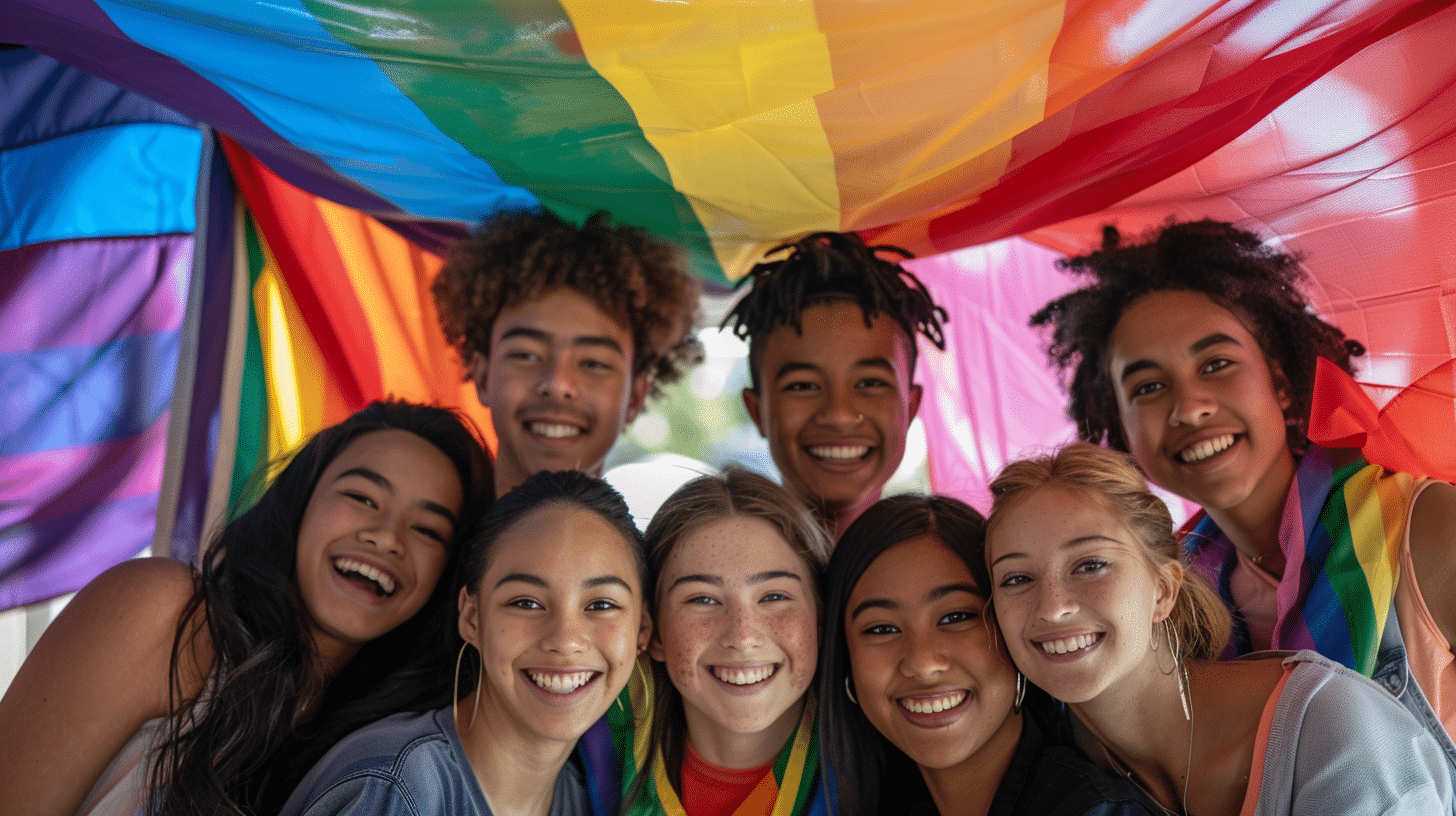
Mental health support is a critical component of a successful academic journey, particularly for LGBTQ students who may face unique challenges related to their sexual orientation or gender identity. Discrimination, stigma, social isolation, and higher rates of mental health issues such as depression, anxiety, and suicidal thoughts are common challenges that LGBTQ students might encounter. Access to tailored mental health resources and supportive communities can make a significant difference in their well-being and academic success.
This guide provides a detailed overview of mental health support resources specifically designed for LGBTQ students. It includes information on campus services, online communities, peer support networks, and national organizations dedicated to the mental health of LGBTQ individuals. By utilizing these resources, LGBTQ students can find the support they need to navigate their mental health challenges and thrive both personally and academically.
1. Campus Mental Health Services
Most colleges and universities offer mental health services through their counseling centers, which often provide specific support for LGBTQ students.
Details:
Counseling Services: Individual and group therapy sessions with counselors trained in LGBTQ issues.
Support Groups: Peer support groups for LGBTQ students to share experiences and provide mutual support.
Crisis Intervention: Immediate support for students in crisis, including 24/7 helplines and emergency counseling.
Workshops and Seminars: Educational sessions on stress management, coping strategies, and mental health awareness.
Confidentiality: Assurance of privacy and confidentiality in all mental health matters.
Online Counseling: Access to teletherapy services for remote or off-campus students.
Examples:
University of Michigan Counseling and Psychological Services (CAPS): Offers LGBTQ+ support groups and individual counseling.
New York University Wellness Exchange: Provides 24/7 mental health support and LGBTQ-specific resources.
2. The Trevor Project
The Trevor Project is a leading organization providing crisis intervention and suicide prevention services to LGBTQ youth. Their comprehensive range of services ensures that support is available whenever needed.
Details:
Crisis Helpline: 1-866-488-7386, available 24/7 for immediate support.
TrevorChat: Online instant messaging service with trained counselors, available 24/7.
TrevorText: Text "START" to 678-678 to connect with a counselor via text message.
TrevorSpace: An online community for LGBTQ youth aged 13-24 to connect and support each other.
Educational Resources: Workshops and materials on LGBTQ mental health and suicide prevention.
Volunteer Opportunities: Training and opportunities for individuals to become crisis counselors.
Research Initiatives: Conducts research to improve understanding and support for LGBTQ youth mental health.
3. It Gets Better Project
The It Gets Better Project aims to uplift, empower, and connect LGBTQ youth worldwide. This platform offers a variety of resources to provide hope and support.
Details:
Support Resources: Thousands of user-submitted videos from people sharing their personal stories and messages of hope.
Community Engagement: Programs to connect LGBTQ youth with mentors and support groups.
Educational Tools: Resources for schools and educators to create inclusive environments and prevent bullying.
Global Reach: Collaborates with international partners to support LGBTQ youth worldwide.
Campaigns: Various campaigns and initiatives aimed at raising awareness and promoting inclusivity.
4. National Queer and Trans Therapists of Color Network (NQTTCN)
NQTTCN is committed to improving mental health access for queer and trans people of color. They offer a directory of therapists and a range of support services.
Details:
Therapist Directory: A searchable database of queer and trans therapists of color across the United States.
Healing Justice Resources: Workshops, trainings, and resources focused on healing justice and collective care.
Community Building: Initiatives to build networks of support among queer and trans people of color.
Mental Health Fund: Provides financial assistance for therapy to those who need it.
Culturally Competent Care: Emphasis on providing mental health care that acknowledges and addresses the unique experiences of people of color.
Webinars and Training: Educational opportunities for mental health professionals and community members.
5. Trans Lifeline
Trans Lifeline is a grassroots hotline and microgrants organization offering direct emotional and financial support to trans people in crisis.
Details:
Hotline: 1-877-565-8860, a peer support hotline run by and for trans people, available 24/7.
Microgrants: Provides financial assistance for legal name changes and other critical expenses for trans individuals.
Policy Advocacy: Works to advocate for policies that support trans rights and mental health.
Resource Hub: Offers a comprehensive directory of resources related to health, legal support, and community organizations.
Volunteer Opportunities: Training for volunteers to provide peer support on the hotline.
Research and Reports: Produces research to inform and improve services and advocacy efforts for trans mental health.
Tips for Accessing Mental Health Support
Utilize Campus Services: Take advantage of on-campus mental health resources.
Join Support Groups: Connect with peers who understand your experiences.
Seek Professional Help: Reach out to therapists who specialize in LGBTQ issues.
Legal and Advocacy Support

Navigating the legal landscape can be particularly challenging for LGBTQ students, who may face discrimination, harassment, and a range of other legal issues related to their sexual orientation or gender identity. Ensuring that LGBTQ students are aware of their rights and have access to legal support and advocacy resources is crucial for creating a safe and inclusive educational environment.
This guide provides an in-depth look at the key resources and organizations dedicated to supporting the legal rights and advocacy needs of LGBTQ students. By leveraging these resources, LGBTQ students can better understand their rights, find support when facing legal issues, and engage in advocacy efforts to promote inclusivity and equality on their campuses and beyond.
1. Lambda Legal
Lambda Legal is the oldest and largest national legal organization whose mission is to achieve full recognition of the civil rights of LGBTQ individuals and those with HIV through impact litigation, education, and public policy work.
Details:
Legal Help Desk: Provides information and resources for LGBTQ individuals facing legal issues.
Case Support: Offers representation in cases of discrimination, harassment, and other legal matters.
Educational Resources: Guides on legal rights and protections for LGBTQ students.
Public Policy Work: Advocates for policies and laws that protect LGBTQ rights.
Community Outreach: Conducts workshops and seminars to educate the public on LGBTQ legal issues.
Impact Litigation: Engages in strategic lawsuits that aim to set precedents and bring about significant legal and policy changes.
2. GLAAD Campus Ambassador Program
The GLAAD Campus Ambassador Program empowers LGBTQ college students to advocate for inclusive policies on their campuses. This program provides training, resources, and support for student activists striving for equality.
Details:
Ambassador Network: Connects students across the country to share strategies and resources.
Training Programs: Workshops on media advocacy, public speaking, and policy change.
Campaigns and Initiatives: Support for campus-wide initiatives to promote inclusivity.
Media Engagement: Provides training on how to effectively use media to advocate for LGBTQ rights.
Resource Sharing: Access to a wealth of materials and tools to support advocacy efforts.
Community Building: Opportunities to connect with other student activists and share best practices.
3. ACLU LGBTQ Student Rights
The ACLU provides comprehensive resources and legal assistance to help LGBTQ students understand their rights and combat discrimination in educational settings.
Details:
Know Your Rights Guides: Comprehensive guides on the legal rights of LGBTQ students in schools.
Legal Support: Assistance with cases of discrimination, harassment, and bullying.
Advocacy Resources: Tools for students to advocate for policy changes at their schools.
Case Studies: Examples of successful legal challenges and advocacy efforts.
Policy Recommendations: Detailed recommendations for schools to create inclusive environments.
Helpline: Confidential helpline for legal advice and support.
4. Human Rights Campaign (HRC)
The Human Rights Campaign is the largest LGBTQ advocacy group and political lobbying organization in the United States. HRC works to ensure LGBTQ people have equal rights at home, at work, and in the community.
Details:
Equality Indexes: Annual reports rating workplaces, municipalities, and healthcare facilities on their LGBTQ inclusivity.
Public Policy Advocacy: Lobbying efforts to pass pro-LGBTQ legislation and policies.
Legal Resources: Guides and toolkits on a variety of legal issues affecting LGBTQ individuals.
Educational Programs: Training and workshops on LGBTQ rights and advocacy.
Community Engagement: Programs to engage and mobilize LGBTQ individuals and allies.
Research and Reports: In-depth research on issues affecting the LGBTQ community.
5. National Center for Lesbian Rights (NCLR)
NCLR is a national legal organization committed to advancing the civil and human rights of LGBTQ people and their families through litigation, public policy advocacy, and public education.
Details:
Legal Representation: Provides legal representation in precedent-setting cases.
Policy Advocacy: Works to change laws and policies that impact the LGBTQ community.
Resource Center: Offers a wealth of legal guides and toolkits on various issues.
Youth Project: Focuses on the rights of LGBTQ youth, particularly in schools and foster care.
Rural Pride Campaign: Addresses the unique challenges LGBTQ individuals face in rural areas.
Family Law Resources: Support for LGBTQ families on issues such as adoption and custody.
Tips for Navigating Legal Challenges
Know Your Rights: Educate yourself on your legal protections.
Seek Legal Help: Contact legal organizations for support.
Get Involved: Participate in advocacy programs and initiatives.
Community and Networking

Building a strong community and network is essential for LGBTQ students navigating their academic and personal lives. Having access to a supportive network can provide emotional support, foster a sense of belonging, and create opportunities for personal and professional growth. For LGBTQ students, finding inclusive spaces and connecting with peers, allies, and supportive organizations can significantly enhance their college experience and overall well-being.
This guide provides a comprehensive overview of community and networking resources available to LGBTQ students. It highlights various organizations, programs, and initiatives designed to create safe and inclusive environments, support academic and personal development, and advocate for LGBTQ rights. By leveraging these resources, LGBTQ students can build strong, supportive networks and find a sense of belonging in their academic communities.
1. Campus Pride
Campus Pride is a leading national organization dedicated to creating safer, more inclusive environments for LGBTQ students. They offer a variety of resources, events, and programs to support LGBTQ students on college campuses.
Details:
Campus Pride Index: Ranks colleges and universities based on their LGBTQ inclusivity, covering policies, programs, and practices.
Events and Conferences: Organizes events like Camp Pride, a leadership camp for LGBTQ and ally students, and the Campus Pride National LGBTQ-Friendly College Fair Program.
Leadership Programs: Training for student leaders to advocate for LGBTQ rights on campus.
Best of the Best List: An annual list of the most LGBTQ-friendly colleges and universities.
Campus Climate Scorecard: A tool to help colleges assess and improve their LGBTQ inclusivity.
Research and Reports: In-depth research on LGBTQ student experiences and campus climates.
2. LGBTQ Centers
Many colleges and universities have dedicated LGBTQ centers that provide support services, safe spaces, and community-building activities. These centers often offer counseling, advocacy, and educational programs tailored to LGBTQ students.
Details:
Support Services: Counseling, peer support groups, and crisis intervention.
Educational Programs: Workshops and seminars on LGBTQ issues, rights, and health.
Community Building: Social events, clubs, and activities to foster a sense of belonging.
Advocacy and Policy Work: Collaborates with campus administration to promote inclusive policies and practices.
Resource Libraries: Access to books, films, and other materials on LGBTQ topics.
Professional Staff: Trained professionals who provide guidance and support to LGBTQ students.
3. Online Communities
Engage with online platforms like Reddit, Tumblr, and Facebook, which host numerous groups where LGBTQ students can connect, share experiences, and support each other. These communities are invaluable for finding peers and allies, especially in less inclusive environments.
Details:
Reddit Communities: Subreddits like r/lgbt, r/queer, and r/trans for discussions and support.
Tumblr Groups: Blogs and tags dedicated to LGBTQ issues and experiences.
Facebook Groups: Private and public groups for LGBTQ students and allies.
Discord Servers: Real-time chat servers for LGBTQ students to connect and communicate.
Forums and Message Boards: Platforms like Empty Closets and AVEN (Asexual Visibility and Education Network) for specific LGBTQ communities.
Anonymous Platforms: Options like Whisper and Yik Yak for confidential sharing and support.
4. Queer-Straight Alliances (QSAs)
Queer-Straight Alliances, also known as Gay-Straight Alliances (GSAs), are student-led organizations that aim to create safe and inclusive environments for LGBTQ students and their allies. They provide a platform for advocacy, education, and social support.
Details:
Formation: Can be started by students with support from faculty or staff advisors.
Activities: Meetings, social events, advocacy campaigns, and educational workshops.
Advocacy: Works to promote LGBTQ rights and inclusivity on campus.
Networking: Connects members with other QSAs and LGBTQ organizations.
Support: Provides a safe space for LGBTQ students to share experiences and seek support.
Resources: Access to educational materials, funding opportunities, and organizational support from national GSA networks.
5. National LGBTQ Organizations
Several national organizations are dedicated to supporting LGBTQ individuals. These organizations provide resources, networking opportunities, and community-building initiatives.
Details:
Human Rights Campaign (HRC):
Programs: HRC Foundation’s Youth Well-Being Program and Welcoming Schools initiative.
Events: Annual HRC Youth Ambassador Summit.
Resources: Educational materials, advocacy guides, and policy updates.
GLAAD:
Programs: Campus Ambassador Program and Spirit Day campaign.
Events: GLAAD Media Awards and other advocacy events.
Resources: Media guides, advocacy toolkits, and educational campaigns.
Trevor Project:
Programs: TrevorSpace, an online community for LGBTQ youth.
Events: Trevor LIVE fundraising events.
Resources: Crisis intervention and suicide prevention services.
PFLAG:
Programs: Support groups and advocacy initiatives.
Events: Annual PFLAG National Convention.
Resources: Educational materials and family support resources.
Tips for Building a Supportive Network
Join Campus Organizations: Get involved in LGBTQ student organizations and clubs.
Participate in Events: Attend LGBTQ-related events and conferences.
Engage Online: Join online communities and forums for additional support.
Academic Support
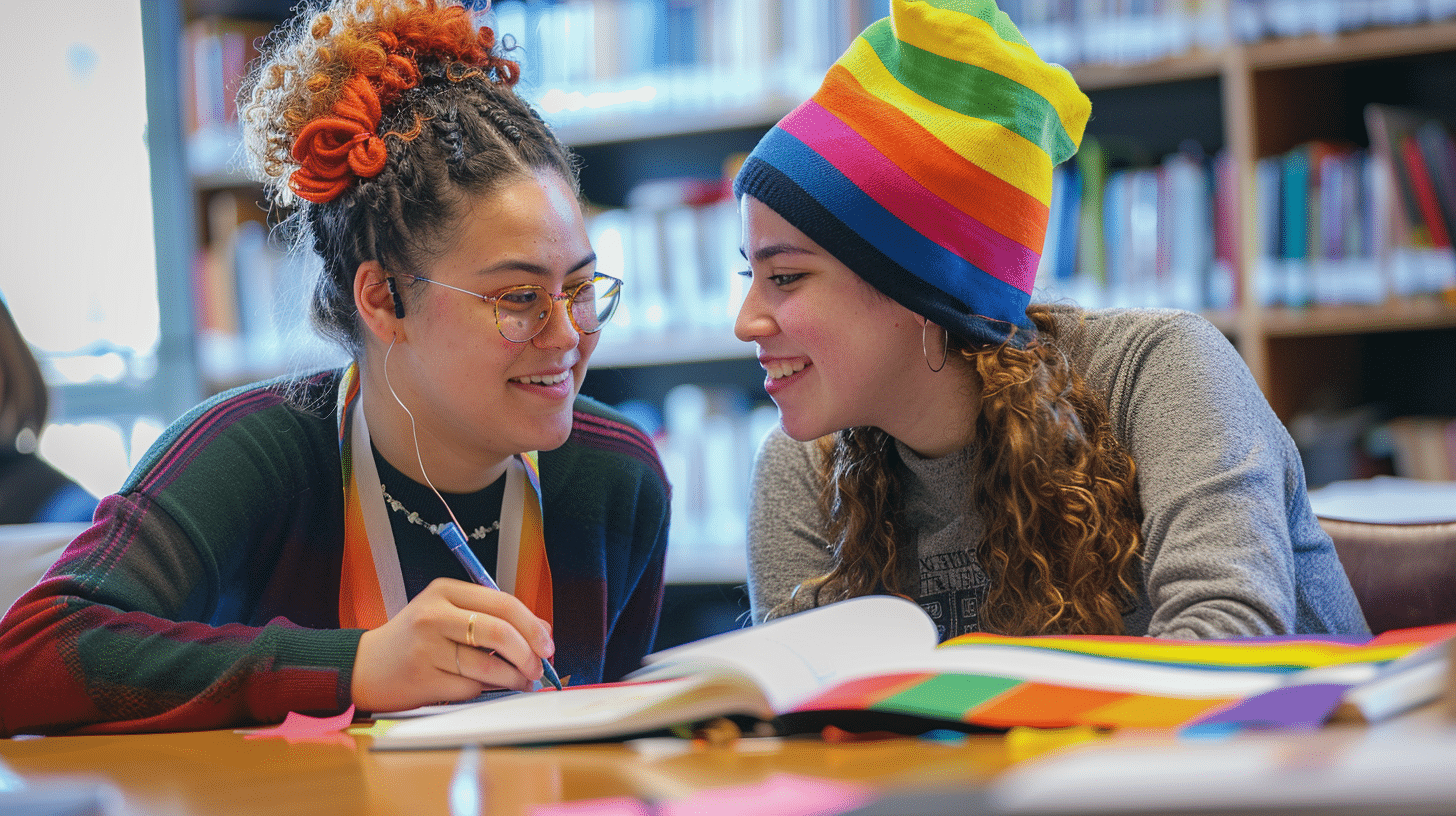
Navigating the academic landscape can be particularly challenging for LGBTQ students, who may face unique barriers related to their sexual orientation or gender identity. Discrimination, lack of representation, and limited access to tailored resources are just a few of the obstacles that can impact their academic success. However, with the right support, LGBTQ students can overcome these challenges and thrive in their educational pursuits.
This guide provides a detailed overview of the various academic support resources available to LGBTQ students. It covers everything from queer studies programs and LGBTQ-friendly colleges to mentorship opportunities and writing support. By leveraging these resources, LGBTQ students can enhance their educational experience, achieve their academic goals, and build a supportive network that will benefit them throughout their academic journey and beyond.
1. Queer Studies Programs
Many universities now offer queer studies programs or courses focused on LGBTQ topics. These programs provide a supportive academic environment and help students explore issues related to gender and sexuality in depth.
Details:
Course Offerings: Includes classes on LGBTQ history, queer theory, gender studies, and intersectionality.
Degree Options: Some universities offer minors, majors, or graduate degrees in queer studies.
Interdisciplinary Approach: Combines perspectives from various fields, including sociology, literature, psychology, and political science.
Research Opportunities: Support for undergraduate and graduate research projects related to LGBTQ topics.
Community Building: Creates a community of scholars and students interested in LGBTQ issues.
2. LGBTQ-Friendly College Guide
The Campus Pride Index ranks colleges based on their LGBTQ inclusivity, helping prospective students find schools that offer a supportive and welcoming environment. This guide evaluates institutions on their policies, programs, and practices related to LGBTQ students.
Details:
Inclusivity Ratings: Scores based on anti-discrimination policies, housing options, and support services.
Student Reviews: Insights from current and former students about campus climate.
Search Tools: Filters for location, size, and specific LGBTQ resources.
Annual Updates: Regularly updated to reflect changes in policies and practices.
Top-Rated Institutions: Highlights colleges and universities that excel in supporting LGBTQ students.
3. Advisors and Mentors
Having access to advisors and mentors who are knowledgeable about LGBTQ issues can make a significant difference in a student's academic journey. Faculty and staff members can provide invaluable guidance, helping students navigate academic challenges and career planning.
Details:
Finding Mentors: Look for faculty members involved in LGBTQ research or advocacy.
Advising Services: Academic advising with a focus on the unique needs of LGBTQ students.
Mentorship Programs: Formal and informal mentorship opportunities within LGBTQ student organizations.
Alumni Networks: Connections to LGBTQ alumni who can offer career advice and support.
Professional Development: Guidance on internships, job opportunities, and graduate
4. LGBTQ Resource Centers
Many universities have LGBTQ resource centers that provide a range of academic support services. These centers often offer tutoring, study spaces, and workshops tailored to the needs of LGBTQ students.
Details:
Tutoring Services: One-on-one or group tutoring sessions in various subjects.
Study Spaces: Safe and inclusive spaces for studying and group work.
Workshops: Academic skills workshops on topics like time management, study strategies, and test preparation.
Resource Libraries: Access to books, articles, and other materials on LGBTQ topics.
Academic Advising: Guidance on course selection, degree planning, and educational policies.
5. Scholarship and Fellowship Opportunities
LGBTQ students have access to numerous scholarships and fellowships that can help alleviate the financial burden of higher education. These opportunities recognize academic achievement, leadership, and community involvement.
Details:
National Scholarships: Awards like the Point Foundation Scholarship, PFLAG National Scholarships, and Pride Foundation Scholarships.
Field-Specific Scholarships: Scholarships for LGBTQ students pursuing careers in specific fields, such as STEM, the arts, or social work.
Graduate Fellowships: Fellowships for LGBTQ students pursuing advanced degrees.
Application Support: Resources and workshops to help students apply for scholarships and fellowships.
Financial Aid Advising: Guidance on navigating financial aid processes and maximizing available resources.
Tips for Academic Support
Utilize Campus Resources: Take full advantage of the LGBTQ resource centers, academic advising, and tutoring services available on your campus. These resources are there to support your educational journey, so make sure to use them.
Connect with Professors: Build relationships with your professors, especially those involved in LGBTQ research or advocacy. They can offer valuable mentorship, academic guidance, and professional development opportunities.
Join Study Groups: Participating in study groups can enhance your understanding of course material and provide a sense of community. Look for LGBTQ-specific study groups or create one if it doesn't exist.
Seek Out Scholarships and Grants: Regularly search for scholarships and grants that are specifically tailored for LGBTQ students. These financial aids can significantly reduce your education-related stress.
Get Involved in LGBTQ Organizations: Joining LGBTQ student organizations can provide academic support, leadership opportunities, and a sense of belonging. These groups often have resources and networks that can help you succeed academically.
Health and Safety
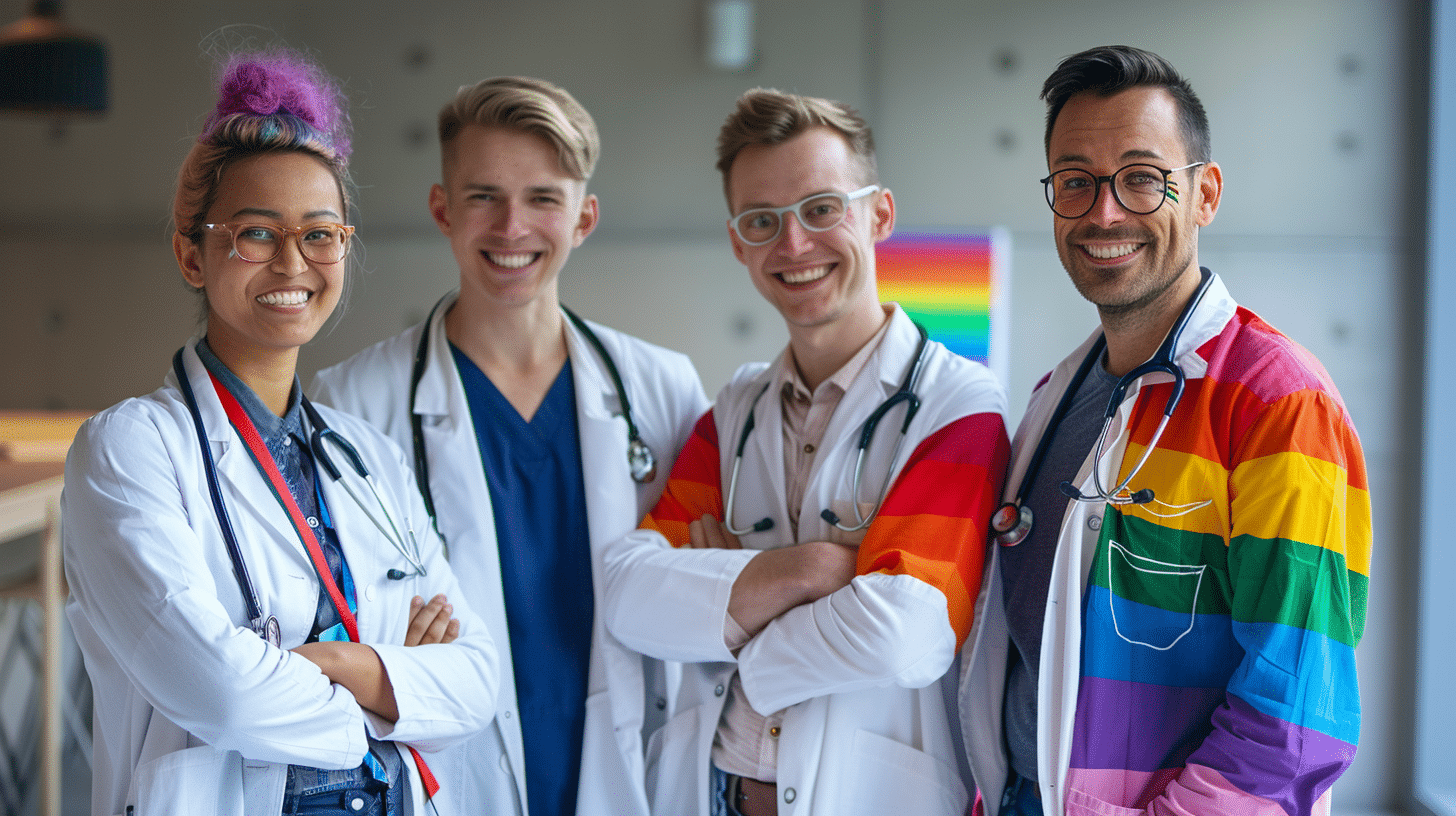
Ensuring health and safety is a top priority for LGBTQ students, who often face unique challenges and barriers in accessing appropriate care and maintaining personal well-being. Discrimination, social stigma, and a lack of understanding from healthcare providers can make it difficult for LGBTQ students to receive the support they need. Additionally, issues related to mental health, sexual health, and personal safety are critical areas where LGBTQ students may require specialized resources and attention.
This guide provides a comprehensive overview of the health and safety resources available to LGBTQ students. It covers important topics such as accessing LGBTQ-specific healthcare, finding mental health support, ensuring personal safety, and understanding legal rights. By leveraging these resources, LGBTQ students can navigate their health and safety concerns with confidence and focus on their academic and personal growth.
1. Campus Health Centers
Many colleges and universities have health centers that provide general and LGBTQ-specific health services. These centers are equipped to address the unique healthcare needs of LGBTQ students.
Details:
General Health Services: Routine check-ups, vaccinations, sexual health services, and treatment for common illnesses.
LGBTQ-Specific Care: Hormone therapy, PrEP (pre-exposure prophylaxis) for HIV prevention, and gender-affirming care.
Mental Health Services: Counseling and psychological services tailored to the needs of LGBTQ students.
Sexual Health Resources: STI testing, contraceptive services, and sexual health education.
Confidentiality: Assurance of privacy and confidentiality in all health matters.
Staff Training: Ongoing training for healthcare providers on LGBTQ cultural competence and sensitivity.
2. Safe Zone Programs
Safe Zone programs create visible support networks for LGBTQ students by training faculty, staff, and students to be allies. Participants display Safe Zone stickers or signs, signaling their commitment to providing a safe and inclusive environment.
Details:
Training Topics: LGBTQ identities, issues, and allyship strategies.
Program Benefits: Increased campus safety, visible ally support, and enhanced community trust.
Participation: Look for Safe Zone signs on campus or inquire at your LGBTQ center.
Workshops and Training: Regular workshops and training sessions for new participants.
Support Networks: Development of a network of allies who can offer support and advocacy.
3. Sexual Health Resources
Access to accurate sexual health information and resources is crucial for LGBTQ students. Many LGBTQ centers and healthcare providers offer resources specifically tailored to the needs of LGBTQ students, including information on safer sex practices, HIV prevention, and STI testing.
Details:
Services Provided: Safer sex kits, educational workshops, and confidential testing services.
Focus Areas: HIV/AIDS prevention, PrEP information, STI testing, and general sexual health education.
Availability: Check your campus health center or local LGBTQ organizations.
Educational Materials: Brochures, online resources, and workshops on sexual health.
Peer Education Programs: Student-led initiatives to promote sexual health awareness and education.
4. Mental Health and Counseling Services
Mental health support is vital for LGBTQ students, who may face higher rates of mental health issues due to discrimination, stigma, and social isolation. Universities should provide inclusive mental health services to address these challenges.
Details:
Counseling Services: Individual and group therapy sessions with counselors trained in LGBTQ issues.
Support Groups: Peer support groups for LGBTQ students to share experiences and provide mutual support.
Crisis Intervention: Immediate support for students in crisis, including 24/7 helplines and emergency counseling.
Workshops and Seminars: Educational sessions on stress management, coping strategies, and mental health awareness.
Confidentiality: Assurance of privacy and confidentiality in all mental health matters.
Online Counseling: Access to teletherapy services for remote or off-campus students.
5. LGBTQ-Specific Health Services
Many health providers offer specialized services tailored to the needs of LGBTQ individuals. These services ensure that LGBTQ students receive competent and respectful care.
Details:
Hormone Therapy: Access to hormone replacement therapy (HRT) for transgender students.
Gender-Affirming Care: Support and services for gender-affirming surgeries and treatments.
HIV/AIDS Care: Comprehensive care for students living with HIV, including medication management and support services.
PrEP and PEP: Access to pre-exposure prophylaxis (PrEP) and post-exposure prophylaxis (PEP) for HIV prevention.
Transgender Health Services: Inclusive care addressing the specific needs of transgender and non-binary students.
LGBTQ Health Clinics: Dedicated clinics that focus on the health needs of LGBTQ individuals.
Tips for Maintaining Health and Safety
Utilize Campus Health Services: Take advantage of LGBTQ-specific health services offered by your campus health center.
Report Incidents: Don't hesitate to report incidents of harassment or discrimination to campus safety offices or legal aid clinics.
Engage in Safety Programs: Participate in personal safety workshops and training sessions to stay informed and prepared.
Online Communities
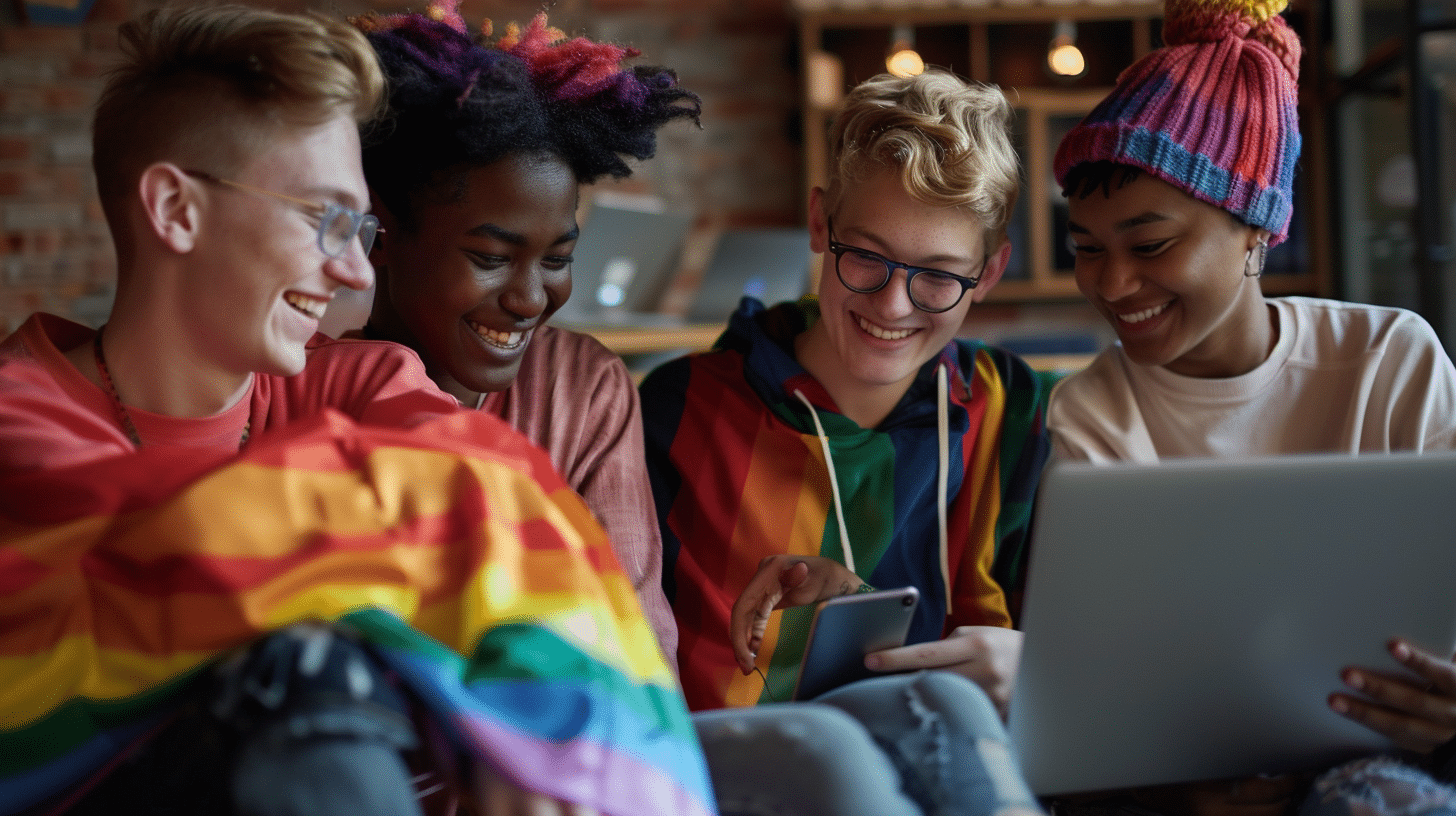
In today’s digital age, online communities are vital in providing support, connection, and resources for LGBTQ students. These virtual spaces offer safe and inclusive environments where LGBTQ individuals can share experiences, seek advice, and build meaningful relationships, regardless of their geographic location. For students who may not have access to vital support networks in their local communities, online platforms can be particularly valuable.
This guide provides an in-depth look at various online communities and resources available to LGBTQ students. It highlights platforms where students can find support, engage in discussions, and access valuable information. By participating in these online communities, LGBTQ students can expand their networks, find solidarity, and gain the confidence to navigate both their academic and personal lives.
1. Reddit Communities
Reddit hosts various subreddits where LGBTQ students can engage in discussions, seek advice, and connect with others who share similar experiences.
Details:
r/lgbt: A large community where members discuss a wide range of LGBTQ-related topics, including coming out, relationships, mental health, and activism.
Features: Weekly discussion threads, resource links, and personal stories.
Moderation: Active moderation to ensure a safe and respectful environment.
r/queer: Focuses on queer identities and issues, with an emphasis on inclusivity and intersectionality.
Features: Discussions on gender identity, sexuality, and queer theory.
Community Engagement: Regular events and community-building activities.
r/transgender: A supportive space for transgender individuals to share their experiences, ask questions, and find resources.
Features: Transition timelines, advice on medical and social transition, and emotional support.
Resources: Links to trans-specific healthcare and legal resources.
r/ainbow: A subreddit for LGBTQ students and young adults to discuss school-related issues and support each other.
Features: Study tips, college advice, and discussions about navigating school as an LGBTQ student.
Peer Support: Opportunities to connect with other LGBTQ students facing similar challenges.
2. Tumblr Communities
Tumblr is known for its active LGBTQ community, with numerous blogs and tags dedicated to LGBTQ issues. It is a great platform for finding resources, connecting with others, and exploring diverse identities.
Details:
Popular Tags: #LGBTQ, #queer, #transgender, #nonbinary, #pride.
Content: Personal stories, art, activism, and educational posts.
Engagement: Reblogs, likes, and comments to interact with content and creators.
Queer Blogs: Many Tumblr users maintain blogs focused on LGBTQ topics, offering a mix of personal experiences, advice, and community engagement.
- Examples: Blogs like "Queer as Fact" and "Trans Lifeline" provide valuable insights and support.
Resource Sharing: Users frequently share resources on mental health, sexual health, legal rights, and more.
- Educational Content: Infographics, articles, and videos on LGBTQ history, rights, and current events.
3. Facebook Groups
Facebook LQBTQ hosts many private and public groups where LGBTQ students can connect with others who share similar experiences. These groups provide a platform for discussions, event planning, and mutual support.
Details:
Types of Groups:
Support Groups: Offer emotional support and advice (e.g., "LGBTQ+ Support Group").
Interest-Based Groups: Focus on specific interests or activities (e.g., "Queer Writers Group").
Local Groups: Connect LGBTQ individuals in specific regions or cities (e.g., "New York City LGBTQ Community").
Privacy Settings:
Public Groups: Open to anyone, and posts are visible to all.
Closed Groups: Membership is required to view posts, providing more privacy.
Secret Groups: Invitation-only, offering the highest level of privacy and security.
Engagement:
Discussion Threads: Members can start and participate in discussions on various topics.
Events: Groups often host virtual and in-person events, such as meetups, workshops, and webinars.
Resource Sharing: Members share links to helpful resources, articles, and support services.
4. Discord Servers
Discord provides real-time chat servers where LGBTQ students can connect, communicate, and build community. These servers often have multiple channels for different topics and interests.
Details:
LGBTQ+ Youth Server:
Features: Channels for general chat, support, advice, and specific interests (e.g., gaming, art).
Moderation: Trained moderators ensure a safe and respectful environment.
Events: Regular virtual events, such as movie nights, game sessions, and Q&A sessions.
Trans Support Server:
Features: Channels for discussing transition, sharing resources, and emotional support.
Peer Support: Opportunities to connect with other transgender individuals for advice and companionship.
Resource Library: A curated collection of links and documents on transgender health, legal rights, and more.
Queer Students Server:
Features: Focuses on academic support, study groups, and school-related advice.
Study Sessions: Scheduled group study sessions and productivity challenges.
Mentorship: Channels where older students or graduates can guide younger members.
5. Forums and Message Boards
Forums and message boards offer a space for more structured and long-form discussions on various LGBTQ topics. These platforms often have dedicated sections for different identities and issues.
Details:
Empty Closets:
Features: Forums for coming out, relationships, mental health, and more.
Community Support: Members share personal stories and offer advice and encouragement.
Resources: Links to helpful articles, books, and support services.
Asexual Visibility and Education Network (AVEN):
Features: Forums focused on asexuality, including discussions on identity, relationships, and visibility.
Educational Resources: Articles and FAQs about asexuality.
Peer Support: Safe space for asexual individuals to connect and share experiences.
TrevorSpace:
Features: An online community for LGBTQ youth aged 13-24, operated by The Trevor Project.
Discussion Boards: Topics include mental health, coming out, school, and relationships.
Safe Environment: Moderated to ensure safety and respect.
Tips for Engaging with Online Communities
Join Relevant Groups: Find online communities that align with your interests and needs.
Participate Actively: Engage in discussions, ask questions, and offer support to others.
Stay Safe Online: Protect your privacy and be cautious about sharing personal information.
Top Activities for LGBTQ Students
| Activity | Approximate Cost | Short Description |
| Join an LGBTQ Student Organization | Free | Engage with campus LGBTQ groups to build community and advocate for inclusivity. |
| Attend a Pride Parade | Free to $20 | Celebrate LGBTQ pride and culture at local and national pride events and parades. |
| Participate in LGBTQ Conferences | $50 to $500+ | Gain insights, network, and learn from experts at conferences like Creating Change. |
| Visit LGBTQ Resource Centers | Free | Access support services, counseling, and community events at your university's center. |
| Engage in Online Communities | Free | Connect with peers on platforms like Reddit, TrevorSpace, and Facebook groups. |
| Volunteer with LGBTQ Organizations | Free | Support LGBTQ causes and gain experience by volunteering with local or national groups. |
| Attend LGBTQ Film Festivals | $10 to $50 per event | Enjoy films that highlight LGBTQ stories and issues at festivals like Outfest. |
| Participate in Safe Zone Training | Free | Become an ally and advocate for LGBTQ inclusivity through campus training programs. |
| Explore LGBTQ-Friendly Cafes and Bars | $10 to $50 | Socialize and relax in inclusive spaces that welcome LGBTQ patrons. |
| Join LGBTQ Sports Leagues | $50 to $150 | Stay active and meet new friends in sports leagues and recreational activities. |
| Visit LGBTQ Landmarks | Free to $20 | Learn about LGBTQ history and culture by visiting significant sites and landmarks. |
| Attend LGBTQ Workshops and Seminars | Free to $100 | Enhance your knowledge on LGBTQ issues and skills through educational workshops. |
| Explore LGBTQ Art Exhibits | $10 to $30 | Appreciate art by LGBTQ artists at museums and galleries featuring queer exhibits. |
| Take Part in LGBTQ Advocacy Days | Free | Participate in events like National Coming Out Day and Day of Silence to promote awareness. |
| Join LGBTQ Mentorship Programs | Free | Gain guidance and support through mentorship programs tailored for LGBTQ students. |
Conclusion
Navigating the complexities of college life as an LGBTQ student can be challenging, but with the right resources and support, you can turn these challenges into opportunities for growth, connection, and success. From scholarships that ease the financial burden to mental health support tailored to your needs, and from legal advocacy to vibrant online communities, these seven essential resources are designed to empower you every step of the way.
At Dealhack, we understand the importance of feeling supported and valued, especially during such a transformative period of your life. We hope this guide has provided you with valuable insights and actionable steps to enhance your college experience. Remember, you’re not alone on this journey—there are countless allies, organizations, and peers ready to offer their support and celebrate your unique path.
For our LGBTQ Shopping Guide, explore our list of brands that support the LGBTQIA+ community in the USA.
FAQ
What types of health services are available for LGBTQ students on campus?
Most campus health centers offer a range of services tailored to the needs of LGBTQ students, including routine check-ups, vaccinations, sexual health services, hormone therapy, PrEP for HIV prevention, and mental health counseling. Many centers also have staff trained in LGBTQ cultural competence to provide respectful and knowledgeable care.
How can I find LGBTQ-friendly colleges and universities?
The Campus Pride Index is an excellent resource for identifying LGBTQ-friendly colleges and universities. It ranks institutions based on their policies, programs, and practices related to LGBTQ inclusivity. You can also look for schools with active LGBTQ resource centers, Safe Zone programs, and supportive housing options.
What should I do if I experience discrimination or harassment on campus?
If you experience discrimination or harassment, report the incident to your campus safety office or the designated office for handling such complaints (often the Title IX office or Office of Student Conduct). Many universities also offer confidential legal support services, and advocacy organizations like Lambda Legal and the ACLU can provide additional assistance.
Are there specific scholarships available for LGBTQ students?
Yes, there are numerous scholarships and fellowships available specifically for LGBTQ students. Some well-known scholarships include the Point Foundation Scholarship, PFLAG National Scholarships, and Pride Foundation Scholarships. These scholarships often consider factors like leadership, community involvement, and academic achievement.
How can I find mental health support tailored to LGBTQ students?
Many campus health centers offer mental health services tailored to LGBTQ students, including individual and group counseling. Additionally, organizations like The Trevor Project and the National Queer and Trans Therapists of Color Network (NQTTCN) provide crisis intervention and access to mental health professionals who specialize in LGBTQ issues.
What are Safe Zone programs, and how can they help me?
Safe Zone programs train faculty, staff, and students to ally with the LGBTQ community. Participants display Safe Zone stickers or signs, signaling their commitment to providing a safe and inclusive environment. These programs can increase campus safety, provide visible ally support, and foster a more inclusive community.
Where can I access sexual health resources specific to LGBTQ students?
Many campus health centers and local LGBTQ organizations offer sexual health resources tailored to LGBTQ students. These include safer sex kits, STI testing, PrEP for HIV prevention, and educational workshops. National organizations like Planned Parenthood and the San Francisco AIDS Foundation also provide comprehensive sexual health services.
How can I connect with other LGBTQ students and build a support network?
There are various ways to connect with other LGBTQ students, including by joining campus LGBTQ student organizations, participating in online communities like Reddit and Discord, and attending LGBTQ resource center events. Many universities also offer peer support networks and mentorship programs to help build a supportive community.
What should I consider when looking for LGBTQ-inclusive study abroad programs?
When considering study abroad programs, look for those that prioritize the safety and inclusion of LGBTQ students. Check if the program offers pre-departure training on cultural attitudes toward LGBTQ identities, on-site support, and access to LGBTQ-friendly resources. Organizations like IES Abroad, and CIEE Study Abroad provide inclusive programs and resources.
How can I advocate for more inclusive policies and practices at my university?
You can advocate for more inclusive policies by joining or forming student organizations focused on LGBTQ rights, participating in campus committees, and working with university administration to implement changes. Attend workshops and training sessions on advocacy, and connect with national organizations like Campus Pride and the Human Rights Campaign for additional resources and support.

